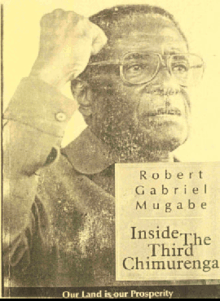National Youth Service (Zimbabwe)
The National Youth Service was a programme of the Zimbabwean government for Zimbabweans of ages 10 to 30. It was introduced in 2000 by Border Gezi—then the Minister for Gender, Youth and Employment—and the first training camp was established at Mount Darwin in 2001.[1][2] Its stated purpose was to "transform and empower youths for nation building through life skills training and leadership development."[3] The National Youth Service had been condemned in the West and in Africa for gross human rights violations on behalf of the ZANU-PF party. Within Zimbabwe the graduates of the service were known pejoratively as "Green Bombers" after the fatigue uniforms they wore [4] and more recently as the "Youth Brigade".[5] [6] The organisation was banned in January 2018 after the fall of Mugabe.

Purpose
The service claimed to instill in young Zimbabweans a sense of national identity and patriotism. While it proposed to unite people above party lines, it also promoted wariness of "foreign influence and intervention" in national politics.[3] The opposing view, both inside Zimbabwe and abroad, held that the service indoctrinated its members with absolute loyalty to ZANU-PF and trained them for military operations to enforce its dominance.[7][8][9] The government planned to make the program mandatory for all youths.[2]
Ideology
According to an opposition group, members of the youth service were taught exclusively from ZANU-PF campaign materials and speeches. These included an anthology of Mugabe's speeches titled Inside the Third Chimurenga. The speeches glorified Mugabe's land reform programme and ZANU-PF leaders Border Gezi and Chenjerai Hunzvi. They accused the Movement for Democratic Change of seeking a return to white rule.[10][11]
Training centres
Conditions in the service training facilities were reported to include poor construction, frequent hunger and sexual abuse of girls and women.[2]
References
- Ndebele, Hazel (3 March 2017). "Reviving storm-troopers: Zanu PF's ploy for 2018". Zimbabwe Independent. Harare. Retrieved 16 November 2017.
- "MPs horrified at Zim youth camps - report". Independent Online. Johannesburg. 24 May 2007. Retrieved 2 July 2008.
- "National Youth Service". Ministry of Youth Development and Employment Creation. Archived from the original on 21 April 2008. Retrieved 2 July 2008.
- Meldrum, Andrew (19 February 2003). "Living in fear of Mugabe's green bombers". The Guardian. London. Retrieved 2 July 2008.
- Modondo, Obert (19 February 2003). "The problem of youth in Mugabe's Zimbabwe". AfricaFiles. Toronto. Retrieved 9 November 2009.
- On the rampage, Radio Netherlands Archives, September 3, 2003
- Makamure, Lucia (15 February 2008). "Kunonga Holed Up in Anglican Cathedral". Zimbabwe Independent. Harare. Retrieved 2 July 2008.
- "Police state". Mail & Guardian. Johannesburg. 4 April 2007. Retrieved 2 July 2008.
- Thompson, Ginger (15 April 2003). "Mugabe's Recruits Flee Brutal Zimbabwean Past". The New York Times. New York. Retrieved 2 July 2008.
- Ranger, Terence (June 2004). "Nationalist historiography, patriotic history and the history of the nation: the struggle over the past in Zimbabwe" (PDF). Journal of Southern African Studies. 30 (2): 215. doi:10.1080/0305707042000215338. Retrieved 2008-07-02.
- Solidarity Peace Trust (5 September 2003). "National Youth Service Training" (PDF). Archived from the original (PDF) on 5 September 2008. Retrieved 2 July 2008.